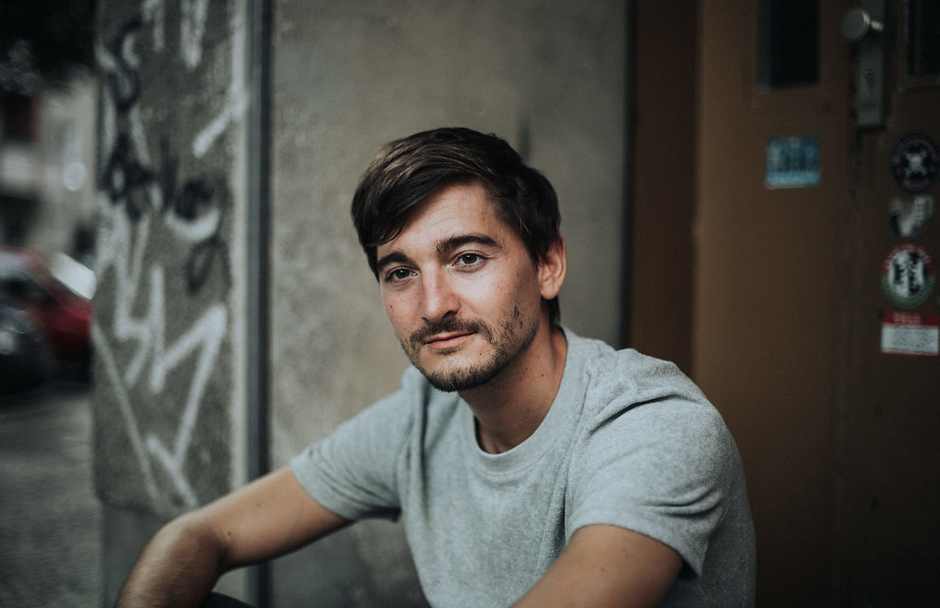Founder, author and journalist with creative and innovative visions
Job variation is key for former HPI D-School student Philipp Reinartz. He studied theatre, film and television, German studies, history, journalism and Design Thinking in Cologne, Zaragoza and Potsdam. In his professional career, he enjoys writing, public speaking and playful and creative activities. In our alumni interview, Philipp tells us more about his career and what role Design Thinking plays in it.
We spoke with HPI D-School alumnus about his career and future, what drives him, and where he gets the courage and motivation for new challenges.
Hi Philipp, you work in various areas in the media and innovation industry, for example as a founder, creative, author and journalist. How did your professional career develop in so many different directions after graduation?
I have always loved variety. And above all, I wanted to make, make, make! I am not a good consumer, so I write books without being a reader, develop games without being a gamer and run a company without ever having studied business. I think I am the embodiment of what some have come to call a "portfolio career". Because I have always believed in it: You don't have to commit to one job! I already preached that when I was 18. But back then everyone said: You have to make a decision at some point. No, you don't have to. You can always try new things and if you're 100% passionate about it, you'll be successful.
My last week looked like this: Monday I was at my agency and planned the week with my team. Tuesday I came up with gags for the SZ magazine. On Wednesday, I presented a show concept to a TV station in Munich. On Thursday, I gave a gamification lecture and did client consultations. And Friday I had a shoot where I presented one of our serious game projects in an NDR documentary.
How does the innovative Design Thinking approach help you in your creative work? Did you learn certain methods at the HPI D-School that you still use today?
Yes, our gamification process combines the best of what I learned in Design Thinking with insights from motivation and game research. We think more in terms of player types and use our own creativity tool “Player Journey”, which we developed from the storytelling model of the “Hero's Journey”. But the basic structure with different phases, alternating between convergent and divergent - i.e. to collect all input and reduce it again to the essentials - that's what I learned from Design Thinking.
Together with friends, you founded the now largest German Escape Room provider and the gamification and serious games agency Pfeffermind. There you support various organizations in educating and motivating their employees through games. What does gamification mean and what opportunities does it open up at the workplace?
Gamification is the use of game elements in contexts that actually have nothing to do with games. So we don't work for games companies, but for corporations like SAP, Samsung or BMW. And for organizations like the Goethe Institute or federal ministries. With all these names, you don't think: Ah, sure, games. But that's exactly what we think about: how can such companies work with playful elements?
The opportunity is that we all spend less time on tedious to-dos and more time doing things we enjoy. Learning can be fun. Boring, repetitive activities can suddenly become exciting. It's fascinating to see how often you can use serious games and gamification to get people engaged, in the flow, wide-eyed, breaking out of the daily grind.
We are moving more and more towards the employee market. In the past, applicants had to fight over the best jobs. Today, employers are fighting over the best talents. We have been talking about the "war for talents" for some years now. And that also means: As an employer, I have to be attractive, offer my people something. Boring processes discourage and reduce motivation. But if the daily work is fun, people are more motivated. That's why more and more companies are recognizing the value of gamification.
You have already published several novels, write for newspapers and audio and TV formats. You not only speak at your own Audible Original series "Memo", but also at events and on TV. Besides gamification, you are interested in football and have hosted shows for the e.g. DFB. What are your visions for your future career? Are there any new creative challenges you would like to tackle?
Sure, again and again. I'm now firmly convinced: it's never too late to go in new directions. I wrote a novel without any previous knowledge and it was published by Rowohlt, my first reportage ended up directly in ZEIT Online. I became a managing director without being able to read a balance sheet and was able to convince Audible to let me produce an audio series with friends from my former school theatre group. Don't let anyone tell you that you need years of experience for everything and that you have to hump forever. Just do it. For me personally, writing Netflix series and hosting TV shows are still on the cards. Of course, that sounds completely presumptuous, but see above ;) .
Find out more about Philipp Reinartz on his website and get to know the gamification and serious games agency Pfeffermind.
The interview was conducted by Anna Dotzek and Stefanie Schwerdtfeger.

